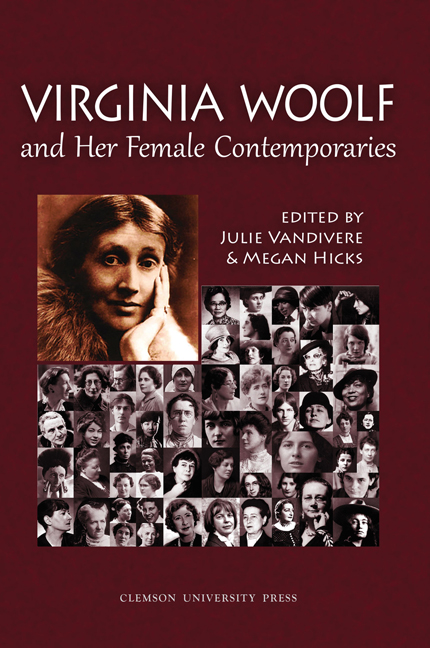Book contents
- Frontmatter
- Table of Contents
- Introduction
- Acknowledgments
- Abbreviations
- Who Are Virginia Woolf's Female Contemporaries?
- Virginia Woolf's Cultural Contexts
- Virginia Woolf's Contemporaries Abroad
- Reconfiguring the Mermaid: HD, Virginia Woolf, and the Radical Ethics of Writing as Marine Practice
- A Carnival of the Grotesque: Feminine Imperial Flânerie in Virginia Woolf 's “Street Haunting” and Una Marson's “Little Brown Girl”
- Mad Women: Dance, Female Sexuality, and Surveillance in the Work of Virginia Woolf and Emily Holmes Coleman
- Shop My Closet: Virginia Woolf, Marianne Moore, and Fashion Contemporaries
- Virginia Woolf and Victoria Ocampo: A Brazilian Perspective
- Making Waves in Lonely Parallel: Evelyn Scott and Virginia Woolf
- Critical Characters in Search of an Author: Cornelia Sorabji and Virginia Woolf
- “In my mind I saw my mother”: Virginia Woolf, Zitkala-Ša, and Autobiography
- Virginia Woolf's Contemporaries at Home
- Tribute to Jane Marcus
- Notes on Contributors
- Conference Program 223
“In my mind I saw my mother”: Virginia Woolf, Zitkala-Ša, and Autobiography
from Virginia Woolf's Contemporaries Abroad
- Frontmatter
- Table of Contents
- Introduction
- Acknowledgments
- Abbreviations
- Who Are Virginia Woolf's Female Contemporaries?
- Virginia Woolf's Cultural Contexts
- Virginia Woolf's Contemporaries Abroad
- Reconfiguring the Mermaid: HD, Virginia Woolf, and the Radical Ethics of Writing as Marine Practice
- A Carnival of the Grotesque: Feminine Imperial Flânerie in Virginia Woolf 's “Street Haunting” and Una Marson's “Little Brown Girl”
- Mad Women: Dance, Female Sexuality, and Surveillance in the Work of Virginia Woolf and Emily Holmes Coleman
- Shop My Closet: Virginia Woolf, Marianne Moore, and Fashion Contemporaries
- Virginia Woolf and Victoria Ocampo: A Brazilian Perspective
- Making Waves in Lonely Parallel: Evelyn Scott and Virginia Woolf
- Critical Characters in Search of an Author: Cornelia Sorabji and Virginia Woolf
- “In my mind I saw my mother”: Virginia Woolf, Zitkala-Ša, and Autobiography
- Virginia Woolf's Contemporaries at Home
- Tribute to Jane Marcus
- Notes on Contributors
- Conference Program 223
Summary
In my research and teaching, I find great value in placing texts together that might not immediately seem compatible but that in fact resonate strongly with each other and open new gateways into literary and cultural analysis. This essay places the autobiographical writings of Virginia Woolf (1882–1941) alongside those of her Native American contemporary Zitkala-Ša (1876–1938) to explore how each writer responds to patriarchal and colonial paradigms; how mothers and maternal loss shape their autobiographies; how physical and psychological place and displacement influence their lives and writing; and how matters of audience affect their literary self-portraits. Significant differences of course exist between Woolf, raised in an upper-middle-class family in late-Victorian England, and Zitkala-Ša, born at the height of America's “Indian wars” and initiatives to eradicate Native American languages, cultures, and spiritualities. Nevertheless, a “productive interaction” arises from reading them together (Okker 98), yielding fresh insights into the intersections of race, class, gender, and nation in women's writing.
In her memoir, “A Sketch of the Past” (1939), Woolf describes her first childhood impressions, her memories of her mother, and her complicated response to her mother's death when Woolf was thirteen. She writes of the aftermath of that death, her problematic relationship with her father, her and her sister Vanessa's maturity into adulthood, and the pressure exerted upon them by their half-brothers to participate in high society. She also considers the nature of biography, autobiography, and memory. Gertrude Simmons Bonnin was a Dakota Sioux writer, musician, and activist born on the Yankton reservation in South Dakota in 1876, adopting the name Zitkala-Ša, Red Bird, when she began writing. Zitkala-Ša's mother raised her in traditional Dakota ways until she was eight, when she left to attend White's Manual Labor Institute, a Quaker boarding school for Native Americans in Wabash, Indiana. She wouldn't see her mother or the reservation again for the next three years. In January, February, and March of 1900, Zitkala-Ša published three autobiographical sketches in The Atlantic Monthly: “Impressions of an Indian Childhood,” about her formative years on the reservation; “The School Days of an Indian Girl,” about her experiences at boarding school and Earlham College; and “An Indian Teacher Among Indians,” about her time as a teacher at Carlisle Indian School.
- Type
- Chapter
- Information
- Virginia Woolf and Her Female Contemporaries , pp. 143 - 148Publisher: Liverpool University PressPrint publication year: 2016



